高级英语张汉熙笔记
- 格式:doc
- 大小:171.50 KB
- 文档页数:12
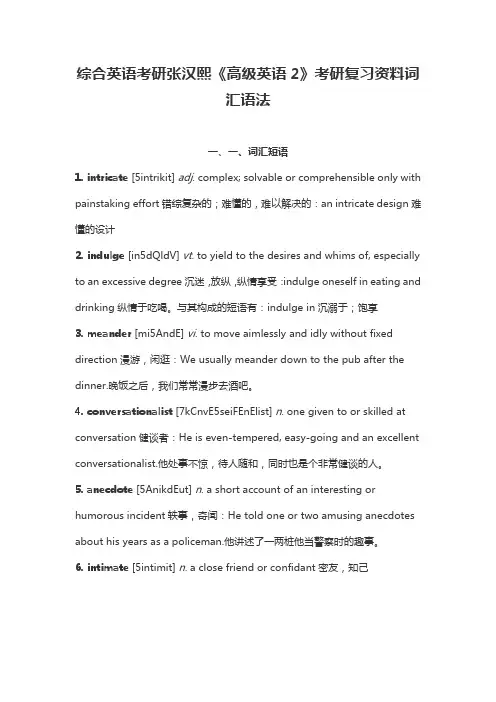
综合英语考研张汉熙《高级英语2》考研复习资料词汇语法一、一、词汇短语1. intricate [5intrikit] adj. complex; solvable or comprehensible only with painstaking effort错综复杂的;难懂的,难以解决的:an intricate design难懂的设计2. indulge [in5dQldV] vt. to yield to the desires and whims of, especially to an excessive degree沉迷,放纵,纵情享受:indulge oneself in eating and drinking纵情于吃喝。
与其构成的短语有:indulge in沉溺于;饱享3. meander [mi5AndE] vi. to move aimlessly and idly without fixed direction漫游,闲逛:We usually meander down to the pub after the dinner.晚饭之后,我们常常漫步去酒吧。
4. conversationalist [7kCnvE5seiFEnElist] n. one given to or skilled at conversation健谈者:He is even-tempered, easy-going and an excellent conversationalist.他处事不惊,待人随和,同时也是个非常健谈的人。
5. anecdote [5AnikdEut] n. a short account of an interesting or humorous incident轶事,奇闻:He told one or two amusing anecdotes about his years as a policeman.他讲述了一两桩他当警察时的趣事。
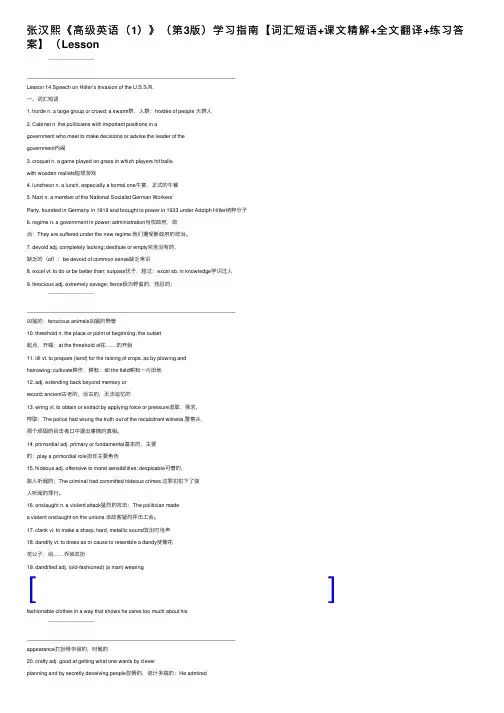
张汉熙《⾼级英语(1)》(第3版)学习指南【词汇短语+课⽂精解+全⽂翻译+练习答案】(LessonLesson 14 Speech on Hitler’s Invasion of the U.S.S.R.⼀、词汇短语1. horde n. a large group or crowd; a swarm群,⼈群:hordes of people ⼤群⼈2. Cabinet n. the politicians with important positions in agovernment who meet to make decisions or advise the leader of thegovernment内阁3. croquet n. a game played on grass in which players hit ballswith wooden mallets槌球游戏4. luncheon n. a lunch, especially a formal one午宴,正式的午餐5. Nazi n. a member of the National Socialist German Workers’Party, founded in Germany in 1919 and brought to power in 1933 under Adolph Hitler纳粹分⼦6. regime n. a government in power; administration当权政府,统治:They are suffered under the new regime.他们遭受新政府的统治。
7. devoid adj. completely lacking; destitute or empty完全没有的,缺乏的(of):be devoid of common sense缺乏常识8. excel vt. to do or be better than; surpass优于,超过:excel sb. in knowledge学识过⼈9. ferocious adj. extremely savage; fierce极为野蛮的,残忍的;凶猛的:ferocious animals凶猛的野兽10. threshold n. the place or point of beginning; the outset起点,开端:at the threshold of在……的开始11. till vt. to prepare (land) for the raising of crops, as by plowing andharrowing; cultivate耕作,耕耘:till the field耕耘⼀⽚⽥地12. adj. extending back beyond memory orrecord; ancient古⽼的,远古的,⽆法追忆的13. wring vt. to obtain or extract by applying force or pressure迫取,强求,榨取:The police had wrung the truth out of the recalcitrant witness.警察从那个顽固的⽬击者⼝中逼出事情的真相。
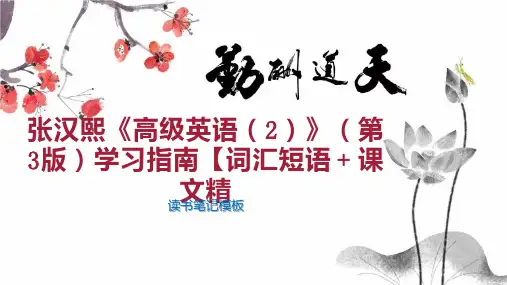
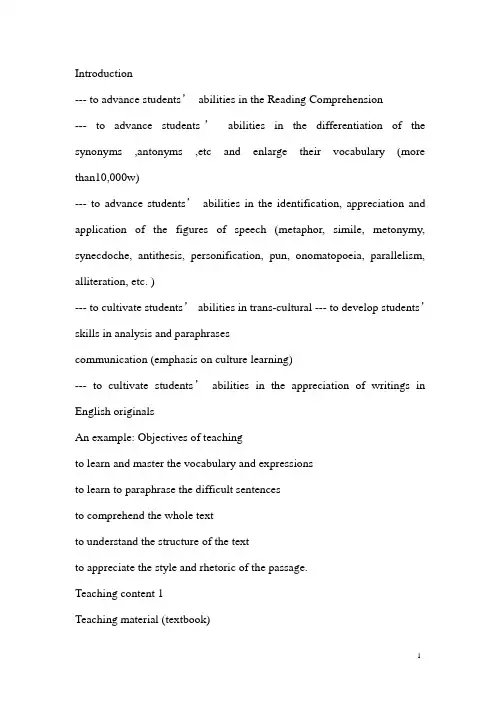
Introduction--- to advance students’abilities in the Reading Comprehension--- to advance students’abilities in the differentiation of the synonyms ,antonyms ,etc and enlarge their vocabulary (more than10,000w)--- to advance students’abilities in the identification, appreciation and application of the figures of speech (metaphor, simile, metonymy, synecdoche, antithesis, personification, pun, onomatopoeia, parallelism, alliteration, etc. )--- to cultivate students’abilities in trans-cultural --- to develop students’skills in analysis and paraphrasescommunication (emphasis on culture learning)--- to cultivate students’abilities in the appreciation of writings in English originalsAn example: Objectives of teachingto learn and master the vocabulary and expressionsto learn to paraphrase the difficult sentencesto comprehend the whole textto understand the structure of the textto appreciate the style and rhetoric of the passage.Teaching content 1Teaching material (textbook)“Advanced English” Boo k 1---Zhang Hanxi (张汉熙主编)---Foreign Language Teaching and Research Press (外语教学与研究出版社)How to Write a Book ReportThe front cover includesTitle(书名/文章题目): _____________Author(作者):_______________Class and grade:_______________No. of pages or no. of words(页数或字数):______________Name the main character(主人公):___Date: M/D/YHow to Write a Book Report p1. Brief introduction to the author and the book;2. The peculiarity of the book in the expressing or developing the content;3. The most impressive part ;4. The message delivered by the author;5. Your favorite part;6. Your comment or opinion on the book;7. What you have got after reading the book;8. The citations.Unit One The Middle Eastern BazaarLead-inTextual Structure of the TextDetailed Study of the TextRhetorical DevicesThe Middle EastGenerally referring to the area from Afghanistan to Egypt, including the Arabian Peninsula, Cyprus, and Asiatic Turkey.The Middle East is a loosely defined geographic region; the countries listed are generally considered part of the Middle East. These Middle East countries are part of the Asian continent, with the exception of Egypt, which is part of Africa, and the northwestern part of Turkey, which is part of the European landmass.Rich in oil, linking point of three continents. Nearby five seas: Black Sea, Mediterranean Sea, Red Sea, Arabian Sea, Caspian Sea (里海)BazaarBazaar: A market consisting of a street lined with shops and stalls, especially one in the Middle East.---handicraft economy, contrast to the modern societyThree famous bazaars in the Middle East:The Khan Khalili Bazaar in Cairo, Egypt埃及开罗汗·哈利利集市The Grand Bazaar in Istanbul, Turkey土耳其伊斯坦布尔大市集The Damascus Bazaar in Syria叙利亚大马士革集市China’s most busiest markets:Xiushui Street and Da Zha Lan in Beijing北京大栅栏和秀水街References“The history of Middle East”(Mesopotamia Civilization, Civilization of Ancient Egypt, Middle East Wars)“The Bible—Old Testament”(the first half of the Christian Bible)“Talmud”塔尔穆德(犹太法典)(the basis of religious authority in Orthodox Judaism)犹太法典中的几句箴言有四种人,一种人说:“我的是我的,你的是你的。
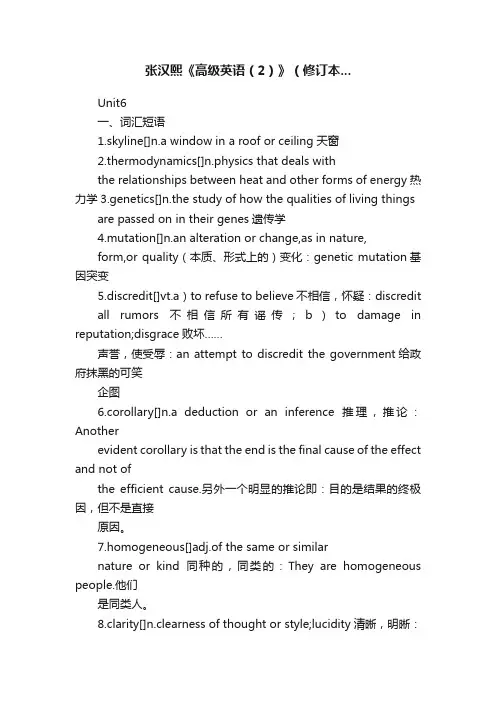
张汉熙《高级英语(2)》(修订本...Unit6一、词汇短语1.skyline[]n.a window in a roof or ceiling天窗2.thermodynamics[]n.physics that deals withthe relationships between heat and other forms of energy热力学3.genetics[]n.the study of how the qualities of living things are passed on in their genes遗传学4.mutation[]n.an alteration or change,as in nature,form,or quality(本质、形式上的)变化:genetic mutation基因突变5.discredit[]vt.a)to refuse to believe不相信,怀疑:discreditall rumors不相信所有谣传;b)to damage in reputation;disgrace败坏……声誉,使受辱:an attempt to discredit the government给政府抹黑的可笑企图6.corollary[]n.a deduction or an inference推理,推论:Anotherevident corollary is that the end is the final cause of the effect and not ofthe efficient cause.另外一个明显的推论即:目的是结果的终极因,但不是直接原因。
7.homogeneous[]adj.of the same or similarnature or kind同种的,同类的:They are homogeneous people.他们是同类人。
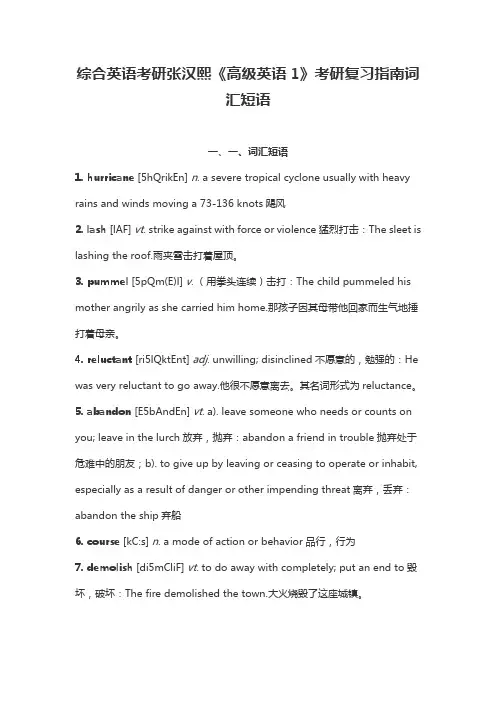
综合英语考研张汉熙《高级英语1》考研复习指南词汇短语一、一、词汇短语1. hurricane [5hQrikEn] n. a severe tropical cyclone usually with heavy rains and winds moving a 73-136 knots飓风2. lash [lAF] vt. strike against with force or violence猛烈打击:The sleet is lashing the roof.雨夹雪击打着屋顶。
3. pummel [5pQm(E)l] v.(用拳头连续)击打:The child pummeled his mother angrily as she carried him home.那孩子因其母带他回家而生气地捶打着母亲。
4. reluctant [ri5lQktEnt] adj. unwilling; disinclined不愿意的,勉强的:He was very reluctant to go away.他很不愿意离去。
其名词形式为reluctance。
5. abandon [E5bAndEn] vt. a). leave someone who needs or counts on you; leave in the lurch放弃,抛弃:abandon a friend in trouble抛弃处于危难中的朋友;b). to give up by leaving or ceasing to operate or inhabit, especially as a result of danger or other impending threat离弃,丢弃:abandon the ship弃船6. course [kC:s] n. a mode of action or behavior品行,行为7. demolish [di5mCliF] vt. to do away with completely; put an end to毁坏,破坏:The fire demolished the town.大火烧毁了这座城镇。
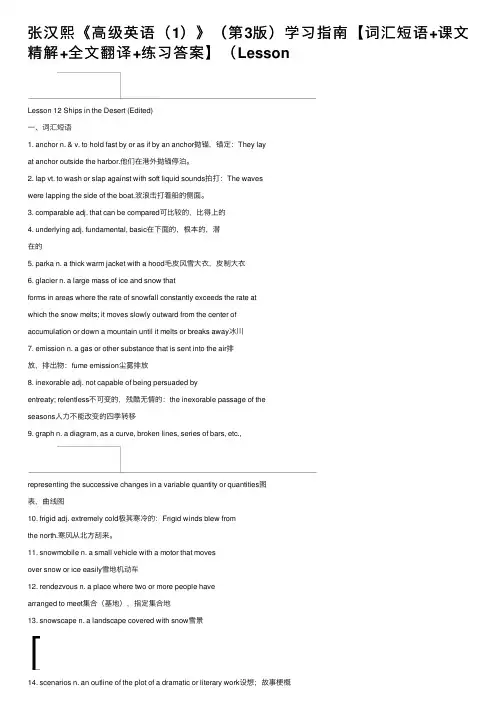
张汉熙《⾼级英语(1)》(第3版)学习指南【词汇短语+课⽂精解+全⽂翻译+练习答案】(LessonLesson 12 Ships in the Desert (Edited)⼀、词汇短语1. anchor n. & v. to hold fast by or as if by an anchor抛锚,锚定:They layat anchor outside the harbor.他们在港外抛锚停泊。
2. lap vt. to wash or slap against with soft liquid sounds拍打:The waveswere lapping the side of the boat.波浪击打着船的侧⾯。
3. comparable adj. that can be compared可⽐较的,⽐得上的4. underlying adj. fundamental, basic在下⾯的,根本的,潜在的5. parka n. a thick warm jacket with a hood⽑⽪风雪⼤⾐,⽪制⼤⾐6. glacier n. a large mass of ice and snow thatforms in areas where the rate of snowfall constantly exceeds the rate atwhich the snow melts; it moves slowly outward from the center ofaccumulation or down a mountain until it melts or breaks away冰川7. emission n. a gas or other substance that is sent into the air排放,排出物:fume emission尘雾排放8. inexorable adj. not capable of being persuaded byentreaty; relentless不可变的,残酷⽆情的:the inexorable passage of theseasons⼈⼒不能改变的四季转移9. graph n. a diagram, as a curve, broken lines, series of bars, etc.,representing the successive changes in a variable quantity or quantities图表,曲线图10. frigid adj. extremely cold极其寒冷的:Frigid winds blew fromthe north.寒风从北⽅刮来。
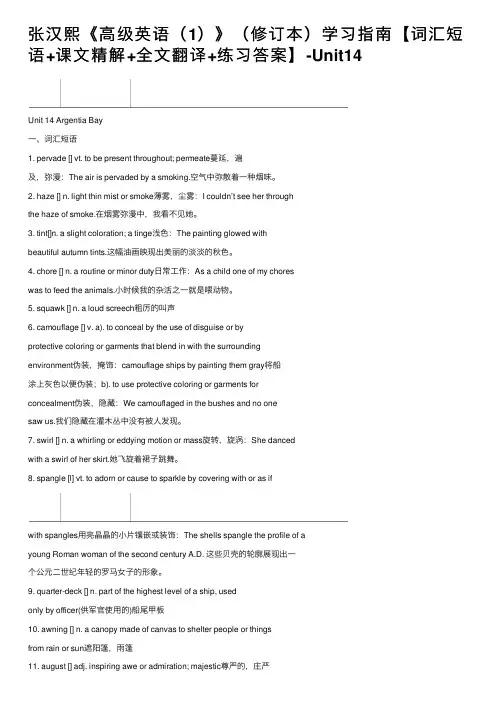
张汉熙《⾼级英语(1)》(修订本)学习指南【词汇短语+课⽂精解+全⽂翻译+练习答案】-Unit14Unit 14 Argentia Bay⼀、词汇短语1. pervade [] vt. to be present throughout; permeate蔓延,遍及,弥漫:The air is pervaded by a smoking.空⽓中弥散着⼀种烟味。
2. haze [] n. light thin mist or smoke薄雾,尘雾:I couldn’t see her throughthe haze of smoke.在烟雾弥漫中,我看不见她。
3. tint[]n. a slight coloration; a tinge浅⾊:The painting glowed withbeautiful autumn tints.这幅油画映现出美丽的淡淡的秋⾊。
4. chore [] n. a routine or minor duty⽇常⼯作:As a child one of my choreswas to feed the animals.⼩时候我的杂活之⼀就是喂动物。
5. squawk [] n. a loud screech粗厉的叫声6. camouflage [] v. a). to conceal by the use of disguise or byprotective coloring or garments that blend in with the surroundingenvironment伪装,掩饰:camouflage ships by painting them gray将船涂上灰⾊以便伪装;b). to use protective coloring or garments forconcealment伪装,隐藏:We camouflaged in the bushes and no onesaw us.我们隐藏在灌⽊丛中没有被⼈发现。
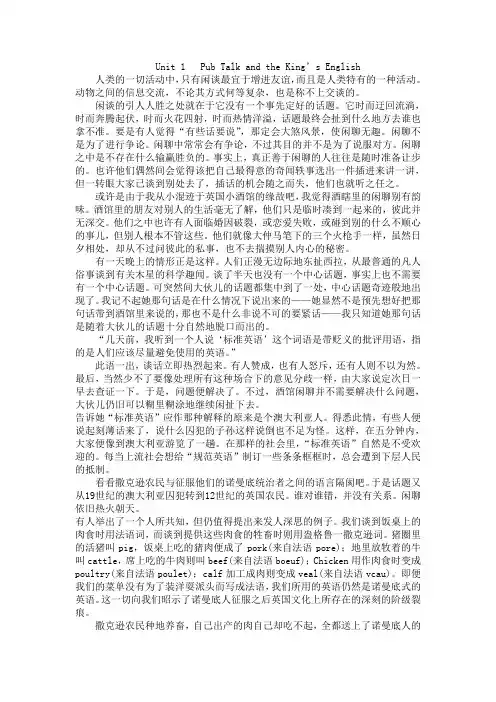
Unit 1 Pub Talk and the King’s English 人类的一切活动中,只有闲谈最宜于增进友谊,而且是人类特有的一种活动。
动物之间的信息交流,不论其方式何等复杂,也是称不上交谈的。
闲谈的引人人胜之处就在于它没有一个事先定好的话题。
它时而迂回流淌,时而奔腾起伏,时而火花四射,时而热情洋溢,话题最终会扯到什么地方去谁也拿不准。
要是有人觉得“有些话要说”,那定会大煞风景,使闲聊无趣。
闲聊不是为了进行争论。
闲聊中常常会有争论,不过其目的并不是为了说服对方。
闲聊之中是不存在什么输赢胜负的。
事实上,真正善于闲聊的人往往是随时准备让步的。
也许他们偶然间会觉得该把自己最得意的奇闻轶事选出一件插进来讲一讲,但一转眼大家已谈到别处去了,插话的机会随之而失,他们也就听之任之。
或许是由于我从小混迹于英国小酒馆的缘故吧,我觉得酒瞎里的闲聊别有韵味。
酒馆里的朋友对别人的生活毫无了解,他们只是临时凑到一起来的,彼此并无深交。
他们之中也许有人面临婚因破裂,或恋爱失败,或碰到别的什么不顺心的事儿,但别人根本不管这些。
他们就像大仲马笔下的三个火枪手一样,虽然日夕相处,却从不过问彼此的私事,也不去揣摸别人内心的秘密。
有一天晚上的情形正是这样。
人们正漫无边际地东扯西拉,从最普通的凡人俗事谈到有关木星的科学趣闻。
谈了半天也没有一个中心话题,事实上也不需要有一个中心话题。
可突然间大伙儿的话题都集中到了一处,中心话题奇迹般地出现了。
我记不起她那句话是在什么情况下说出来的——她显然不是预先想好把那句话带到酒馆里来说的,那也不是什么非说不可的要紧话——我只知道她那句话是随着大伙儿的话题十分自然地脱口而出的。
“几天前,我听到一个人说‘标准英语’这个词语是带贬义的批评用语,指的是人们应该尽量避免使用的英语。
”此语一出,谈话立即热烈起来。
有人赞成,也有人怒斥,还有人则不以为然。
最后,当然少不了要像处理所有这种场合下的意见分歧一样,由大家说定次日一早去查证一下。
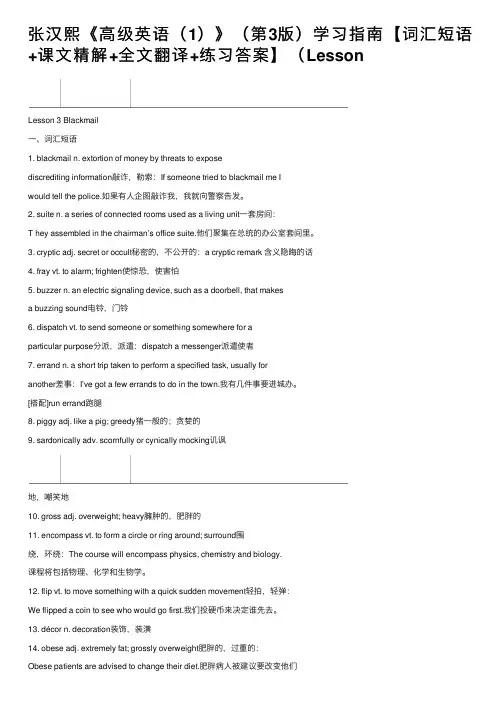
张汉熙《⾼级英语(1)》(第3版)学习指南【词汇短语+课⽂精解+全⽂翻译+练习答案】(LessonLesson 3 Blackmail⼀、词汇短语1. blackmail n. extortion of money by threats to exposediscrediting information敲诈,勒索:If someone tried to blackmail me Iwould tell the police.如果有⼈企图敲诈我,我就向警察告发。
2. suite n. a series of connected rooms used as a living unit⼀套房间:T hey assembled in the chairman’s office suite.他们聚集在总统的办公室套间⾥。
3. cryptic adj. secret or occult秘密的,不公开的:a cryptic remark 含义隐晦的话4. fray vt. to alarm; frighten使惊恐,使害怕5. buzzer n. an electric signaling device, such as a doorbell, that makesa buzzing sound电铃,门铃6. dispatch vt. to send someone or something somewhere for aparticular purpose分派,派遣:dispatch a messenger派遣使者7. errand n. a short trip taken to perform a specified task, usually foranother差事:I’ve got a few errands to do in the town.我有⼏件事要进城办。
[搭配]run errand跑腿8. piggy adj. like a pig; greedy猪⼀般的;贪婪的9. sardonically adv. scornfully or cynically mocking讥讽地,嘲笑地10. gross adj. overweight; heavy臃肿的,肥胖的11. encompass vt. to form a circle or ring around; surround围绕,环绕:The course will encompass physics, chemistry and biology.课程将包括物理、化学和⽣物学。
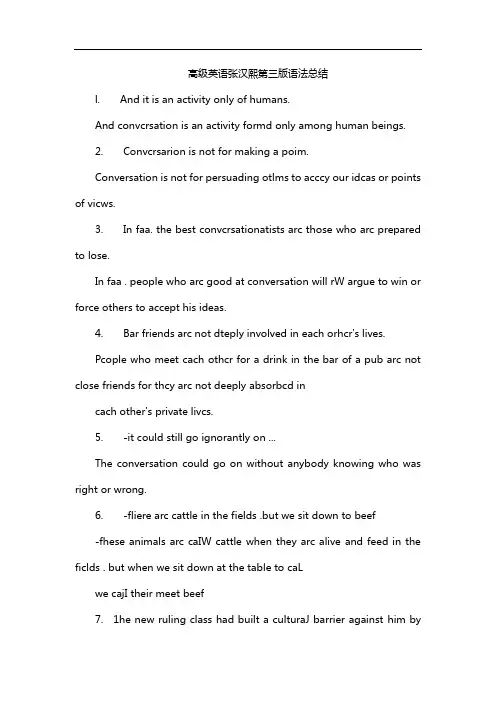
高级英语张汉熙第三版语法总结l. And it is an activity only of humans.And convcrsation is an activity formd only among human beings.2. Convcrsarion is not for making a poim.Conversation is not for persuading otlms to acccy our idcas or points of vicws.3. In faa. the best convcrsationatists arc those who arc prepared to lose.In faa . people who arc good at conversation will rW argue to win or force others to accept his ideas.4. Bar friends arc not dteply involved in each orhcr's lives.Pcople who meet cach othcr for a drink in the bar of a pub arc not close friends for thcy arc not deeply absorbcd incach other's private livcs.5. -it could still go ignorantly on ...The conversation could go on without anybody knowing who was right or wrong.6. -fliere arc cattle in the fields .but we sit down to beef-fhese animals arc caIW cattle when they arc alive and feed in the ficlds . but when we sit down at the table to caLwe cajI their meet beef7. 1he new ruling class had built a culturaJ barrier against him bybuilding their French against his ownlanguage.The new ruling class by using Frcnch instead of English made it hard for the English to accept or absorb theculture of the rulers.8. English had come royally into its ownEnglish received proper rccognition and was used by the King once more.9. 1he phrase has always bccn used a little pejorativcty and even facctiously by the low口classes.。
张汉熙《高级英语(2)》(修订本)学习指南-unit2【圣才出品】Unit 2一、词汇短语1. corpse n. a dead body of a human being尸体2. thread v. to pass through by twisting, turning or weaving in and out穿过,通过:The child threaded the beads.这孩子用线把珠子串起来。
3. pomegranate[n. shrub or small tree native tosouthwestern Asia having large red many-seeded fruit石榴,石榴树4. chant n. a short, simple liturgical song in which a string of syllablesor words is sung to each tune(礼拜式唱的)单调的歌5. bier n. a stand to support a corpse or a coffin prior to burial 棺材架,尸体架6. hack vt. to break up the surface of (soil)开辟,开垦7. oblong adj. deviating from a square, circular, or spherical form bybeing elongated in one direction长方形的8. lumpy adj. full of lumps; covered with lumps多块状物的,凹凸不平的:He could feel the thin, lumpy mattress. 他能感觉到那张薄薄的、凹凸不平的床垫。
9. hummocky adj. full of or looking like low, rounded hills圆丘般的,多圆丘的10. derelict adj. deserted by an owner or keeper; abandoned被遗弃的,无主的:a derelict ship被弃的船11. lot n. a piece of land used for a given purpose一块地:a parking lot停车场12. undifferentiated adj. without clearqualities or distinctive characteristics无差别的,没有显著特点的13. mound n. a pile of earth, gravel, sand, rocks, or debris heaped forprotection or concealment土堆,坟:The explorers climbed a mound tosurvey the land around them.勘探者爬上土丘去勘测周围的土地。
Ⅰ.Paraphrase(3`×5=15`)1.Unit51.The slighted mention of the decade brings nostalgic recollections to the middle-aged...At the very mention of this postwar period ,middle-aged people begin to think about it longingly.2.The rejection of Victorian gentility was , in any case ,inevitable .In any case,an American could not avoid casting aside middle-class respectability and affected refinement.3.The war acted merely as a catalytic agent in this breakdown of the Victorian social structure...The war only helped to speed up the breakdown of the Victorian social structure.4...it was tempted ,in America at least, to escape its responsibilities and retreat behind an air of naughty alcoholic sophistication...In America at least,the young people were strongly inclined to shirk their responsibilities. They pretended to be worldly-wise, drinking and behaving naughtily.5.Prohibition afforded the young the additional opportunity of making their pleasures illicit...The young found greater pleasure in drinking because Prohibition, by making drinking unlawful,added a sense of adventure.6...our young men began to enlist under foreign flags.Our young men joined the armies of foreign countries to fight in the war.7....they “wanted to get into the fun before the whole thing turned belly up.”The young wanted to take part in the glorious adventure before the whole ended.8...they had outgrown towns and families...These young people could no longer adapt themselves to lives in their hometowns or their families.9..the returning veteran also had to face the sodden,Napoleonic cynicism of Versailles,the hypocriticaldo-goodism of Prohibition...The returning veteran also had to face the stupid cynicism of the victorious allies in Versailles who acted as cynically as Napoleon did,and to face Prohibition which the lawmakers hypocritically assumed would do good to the people.10.Something in the tension-ridden youth of America had to “give”...(Under all this force and pressure)something in the youth of America,who were already very tense ,had to break down.11....it was only natural that hopeful young writers , their minds and pens inflamed against war, Babbittry, and “Puritanical” gentility, should flock to the traditional artistic center...It was only natural that hopeful young writers ,whose minds and writings were full of violent anger against war, Babbittry,and “Puritanical” gentility,should come in largen numbers to live in Greenwich Village, the traditional artistic center.12.Each town had its “fast”set which p rided itself on itself on its unconventionality...Each town was proud that it had a group of wild ,reckless people,who lived unconventional lives.2.Unit 31.we observe today not a victory of party but a celebration of freedom, symbolizing an end as well as a beginning, signifying renewal as well as change.What we celebrate today is not a victory of the Democratic Party over the Republican Party, but the freedom which all Americans enjoy, especially the freedom of people to elect their own head of state. It symbolizes the end of Eisenhower s presidential term and the beginning of Kennedy's presidential term. The presidency or the office of president is renewed but the president has changed (from Eisenhower to Kennedy).2. And yet the same revolutionary belief for which our forebears fought is still at issue around the globe, the belief that the rights of man come not from the generosity of the state but from the hand of God.Our ancestors fought a revolutionary war to maintain that all men were created equal and God had given them certain unalienable rights that no ruler or state could take away from them. But today this belief is still in dispute ina lot of countries all over the world.3.This much we pledge —and more.We promise to do this much, and we also promise to do more.3.Unit 61. Nowadays New York is out of phase with American tasteNowadays New York cannot understand nor follow the taste of the American people.2. New York even prides itself on being a holdout from prevailing American trendsNew York boasts that it is a city that resists the prevailing trends (styles, fashion)of America.3. sitcoms cloned and canned in Hollywood, and the Johnny Carson show live, pre-empt the airwaves from CaliforniaSituation comedies made in Hollywood and the actual performance of Johnny Carson now replace the scheduled radio and TV programs for California.4. it is making something of a comeback as a tourist attractionNew York is regaining somewhat its status as a city that attracts tourists.5. To win in New York is to be uneasyA person who wins in New York is constantly disturbed by fear and anxiety (because he is afraid of losing what he has won in the fierce competition).6. Nature’s pleasures are much qualified in New York.The chance to enjoy the pleasures of nature is very limited.7. the city’s bright glow arrogantly obscures the heavensAt night the city of New York is aglow with lights and seems proudly and haughtily to darken the night sky.8. But the purity of a bohemian dedication can be exaggerated.But a pure and wholehearted devotion to a Bohemian life style can be exaggerated.9. In both these roles it ratifies more than it creates.In both these roles of banking and communications head-quarters, New York starts or originates very few things but gives its stamp of approval to many things created by people in other parts of the country.10. The television generation grew up in the insistent presence of hypeThe television generation was constantly and strongly influenced by extravagant promotional advertising.11. those who are writing ambitious novels sustain themselves on the magazinesAuthors writing long serious novels earn their living in the meantime by also writing articles for popular magazines.12. Broadway, which seemed to be succumbing to the tawdriness of its environment, is astir again Broadway, which seemed unable to resist the cheap, gaudy shows put on in the surrounding areas, is once again busy and active.13. he prefers the unhealthy hassle and the vitality of urban life(If you tell a New Yorker about the vigor of outdoor pleasures, he will reply that) he prefers the unhealthy turmoil and animated life of a city.14. The defeated are not hidden away somewhere else on the wrong side of town.Those who failed in the struggle of life, the down-and-outs, are not hidden away in slums or ghettoes where other people can’t see them.15. The place constantly exasperates, at times exhilarates.New York constantly irritates and annoys very much but at times it also invigorates and stimulates.4.Unit 151.Science is committed to the universal.Science is engaged in the task of making its basic concepts understood and accepted by scientists all over the world.2.A sign of this is that the more successful a science becomes, the broader the agreement about its basic concepts: there is not a separate Chinese or American or Soviet thermodynamics, for example; there is simply thermodynamics.A sign of this is that as science becomes successful, more and more people accept its basic concepts. The fact that science transcends national boundaries proves the universality of science.3.Today Lysenko's theory is discredited, and there is now only one genetics.Today Lysenko's theory is proved unscientific and people stop believing it, so there is now only one genetics.4. As the corollary of science technology also exhibits the universalizing tendency.As the natural result of science, technology also shows the universalizing tendency.5. This is why the spread of technology makes the world look ever more homogeneous.This is why the spread of technology with its universalizing tendency makes different countries and people look more similar or identical.6.Children who grow up in this world therefore experience it as a sameness rather than a diversity, and because their identities are shaped by this sameness, their sense of differences among cultures and individuals diminishes.Children growing up in this world feel that countries and people are more or less the same. Because their thoughts and feelings are influenced by this sameness, their sense of differences among cultures and people becomes weak.7. The result is described precisely in a phrase that is already familiar: the disappearance of history.The result of universalizing tendency of science and technology can be described in a phrase that we are already familiar with: the disappearance of history, to be exact, the disappearance of the visible evidence of history.8.If man creates machines, machines in turn shape their creators.Man invents and develops machines, and as a result machines change those who created them9. No longer quite an individual, no longer quite the product of a unique geography and culture, he moves from one climate-controlled shopping mall to another, from one airport to the next from one Holiday Inn to its successor three hundred miles down the road; but somehow his location never changes.The modern man is not an individual any longer. He is no longer a person with distinct traits shaped by a special environment and culture. Wherever he goes, he finds himself in the similar surroundings - the shops are in the same climate with their similar air-conditioning systems, the airports have the similar facilities and the hotels offer the similar amenities.10. He is cosmopolitan.He is universalized.11. The price he pays is that he no longer has a home in the traditional sense of the word.The disadvantage of being a cosmopolitan is that he loses a home in the old sense of the word.12. The benefit is that he begins to suspect home in the traditional sense is another name for limitations, and that home in the modern sense Is everywhere and always surrounded by neighbors.The advantage of being a cosmopolitan is that he begins to think that the old kind of home probably restricts his development and activities, while home in the modern sense is everywhere and he has neighbors all over the world.13. Science has shown the insubstantiality of the world.Science has shown that the world is not made up of solid material objects that we see with our naked eyes.14. It has thus undermined an article of faith: the thingliness of things.In the past, people firmly believed that the things they saw around them were real solid substances, but now science has cast doubt on this belief.15. At the same time, it has produced images of orders of reality underlying the thingliness of things.At the same time, science has produced images of many classes or categories of reality that lie beneath the objective, concrete and tangible images of things in the world that people see with their naked eyes.16 Are images of self-squared dragons more or less real than images of molecules?Self-squared dragons are created by science and they are pure artifacts. So are images of self-squared dragons more or less real than images of molecules?5.Unit21.The burying-ground is merely a huge waste of hummocky earth, like a derelict building-lot.The buring-ground is nothing more than a huge piece of wasteland full of mounds of earth looking like a deserted and abandoned piece of land on which a building was going to be put up.2. All colonial empires are in reality founded upon that fact.All the imperialists build up their empires by treating the people in the colonies like animals (by not treating the people in the colonies as human beings).3. They rise out of the earth, they sweat and starve for a few years, and then they sink back into the nameless mounds of the graveyard.They are born. Then for a few years they work, toil and starve. Finally they die and are buried in graves without a name.4. A carpenter sits cross-legged at a prehistoric lathe, turning chair-legs at lightning speed.Sitting with his legs crossed and using a very old-fashioned lathe, a carpenter quickly gives a round shape to the chair-legs he is making.5. Instantly, from the dark holes all round, there was a frenzied rush of Jews .Immediately from their dark hole-like cells everywhere a great number of Jews rushed out wildly excited.6. every one of them looks on a cigarette as a more or less impossible luxuryEvery one of these poor Jews looked on the cigarette as a piece of luxury which they could not possibly afford. 7. Still, a white skin is always fairly conspicuous.However, a white-skinned European is always quite noticeable.8. In a tropical landscape one's eye takes in everything except the human beings.If you take a look at the natural scenery in a tropical region, you see everything but the human beings.9. No one would think of running cheap trips to the Distressed Areas.No one would think of organizing cheap trips for the tourists to visit the poor slum areas10. for nine-tenths of the people the reality of life is an endless, backbreaking struggle to wring a little food out of an eroded soil.Life is very hard for ninety percent of the people.With hard backbreaking toil they can produce a little food on the poor soil.11. She accepted her status as an old woman, that is to say as a beast of burden.She took it for granted that as an old woman she was the lowest in the community,that。
张汉熙《高级英语(1)》(第3版)学习指南【词汇短语+课文精解+全文翻译+练习答案】(LessonLesson 11 The Way to Rainy Mountain一、词汇短语1. blizzard n. a severe snowstorm characterized by coldtemperatures and heavy drifting of snow大风雪2. anvil n. an iron block on which a blacksmith puts hot pieces ofmetal before shaping them with a hammer铁砧,[解]砧骨3. brittle adj. hard but easily broken易碎的,脆弱的4. hickory n. the hard wood of the N American hickory tree 山核桃属植物5. pecan n. the nut of the American pecan tree with a smoothpinkish-brown shell美洲山核桃树6. witch hazel n. any of several shrubs or trees of thegenus Hamamelis; bark yields an astringent lotion金缕梅7. foliage n. the leaves of a tree or plant; leaves and branches together树叶,植物8. writhe v. to twist or move your body without stopping, often becauseyou are in great pain翻腾9. grasshopper n.an insect with long back legs, that can jump very high and that makesa sound with its legs蚱蜢,蝗虫10. preeminently adv. to a very great degree; especially卓越地;杰出地11. disposition n. the natural qualities of a person’s character性情,性格12. grim adj. looking or sounding very serious, unpleasant and depressing严酷的,冷酷的13. unrelenting adj. 1) not stopping or becoming lesssevere; 2) if a person is unrelenting, they continue with somethingwithout considering the feelings of other people不宽恕的,不屈不挠的;无情的,冷酷的14. canyon n. a long, narrow valley between high cliffs, often with astream flowing through it (美)峡谷,溪谷15. pillage n. the act of stealing things from a place or region,especially in a war, using violence掠夺16. corral n. an closure for holding or capturing horses, cattle or other animals畜栏17. affliction n. pain and suffering or something that causes it 痛苦,苦恼18. brooding adj. sad and mysterious or threatening沉思的,徘徊不去的19. divinity n. the quality of being a god or like God神,神学,神性,上帝20. cleavage n. a division or split between people or groups 劈开,分裂21. elk n. a large deer that lives in the north of Europe, Asia and NorthAmerica. In North America it is called a moose.美洲赤鹿22. badger n. an animal with grey fur and wide black and white lineson its head. Badgers are nocturnal (= active mostly at night) and live inholes in the ground.獾23. flax n. a plant with blue flowers, grown for its stem that is used tomake thread and its seeds that are used to make linseed oil 亚麻24. buckwheat n. small darkseed that is grown as food for animals and for making flour 荞麦25. stonecrop n. (植物)景天26. larkspur n. a tall garden plant with blue, pink or whiteflowers growing up its stem翠雀属植物27. billow v. 1) to fill with air and swell out; 2) to fill with air and swell out翻腾28. sweet clover n. 草木樨植物29. lee n. a sheltered place, especially one on that side of anything awayfrom the wind背风处,庇护所30. profusion n. a very large quantity of something丰富,充沛,慷慨31. deity n. the state of being a god; divine nature; a god orgoddess神,神性32. solstice n. either of the two times of the year at which the sunreaches its highest or lowest point in the sky at midday, marked by thelongest and shortest days至日;冬至或夏至33.caldron n. a large kettle or boiler大锅(炉),大汽锅34.wean v. to cause (oneself or someone else) to give up aformer habit;to withdraw (a person) by degrees (from a habit, object of affection, etc.) asby substituting some other interest使断奶,使放弃,使断念35. ridge n. a narrow area of high land along the top of a line of hills; ahigh pointed area near the top of a mountain山脊,屋脊36. upthrust n. the force with which a liquid or gas pushes upagainst an object that is floating in it向上推,浮力;(地质) 地壳隆起37. engender v. to make a feeling or situation exist造成38. score v. to make cuts or lines in or on something把……记下;划线,刻划;获得;评价39. kinsmen v. a male relative男性亲属40. tenuous adj. 1) so weak or uncertain that it hardly exists;2)extremely thin and easily broken纤细的,脆弱的;稀薄的;贫乏的41. reverence n. a feeling of great respect or admiration forsomebody/something尊敬,敬畏42. consummate adj. extremely skilled; perfect完美的,圆满的43. impale v. to pierce through or fix with a sharp object刺穿,(作为刑罚) 把……钉在尖桩上;使绝望44. barter n. the system of exchanging goods, property, services, etc.for other goods, etc. without using money物品交换,实物交易45. deicide n. the killing of a god杀神,杀神者,害死耶稣的人46. skillet n. a small frying pan煮锅,长柄浅锅47. rambling adj. spreading in various directions with noparticular pattern漫步的,散漫的,流浪性的48. shawl n. a large piece of cloth worn by a woman around the shouldersor head, or wrapped around a baby披肩,围巾49. sentinel n. a soldier whose job is to guard something哨兵50. opaque adj. not able to be seen through; not transparent ortranslucent不透明的,不传热的,迟钝的51. abide v. to dislike somebody/something so much that you hatehaving to be with or deal with them忍受,容忍;持续,遵守52. ample adj. large, often in an attractive way充足的,丰富的,宽敞的53. council n. a group of people who are elected to govern anarea such as a city or county政务会,理事会,委员会54. servitude n. the condition of being a slave or beingforced to obey another person劳役,奴役;奴隶状态;地役权55. fright n. a feeling of fear惊骇,惊吓,害怕56. nocturnal adj. of the night夜的,夜曲的,夜间发生的57. wake n. a watch or vigil held over the body of a dead person duringthe night before burial (葬礼前)守夜,看护58. perch v. to alight or rest on栖息,位于,使坐落于59. handrail n. a long, narrow bar that you can hold onto forsupport, for example when you are going up or down stairs 栏杆,扶手60. purl v. to flow with a gentle movement and amurmuring sound潺潺流水61. scissortail n. (美洲)叉尾霸鹟62. hie v. to go quickly催促,赶快二、课文精解1.The Way to Rainy Mountain:《雨山之路》(1969年)是由普利策奖获得者斯科特写的一篇散文。
高级英语的十九种修辞和高英1-5课总结张汉熙第一篇:高级英语的十九种修辞和高英1-5课总结张汉熙Figures of speech: simile, metaphor, personification, synecdoche, anticlimax, metonymy, repetition, exaggeration, euphemism, antonomasia, parody.1)Little monkeys with harmoniously tinkling bells thread their way among the throngs of people entering and leaving the bazaar.(metaphor)-----Page1,Lesson1.2)It grows louder and more distinct ,until you round a corner and see a fairyland of dancing flashes ,as the burnished copper catches the light of innumerable lamps and braziers.(metaphor and personification)----------P2,L1.3)The dye-market, the pottery-market, and the carpenters’ market lie elsewhere in the maze of vaulted streets which honeycomb this bazaar.(metaphor)-----P3,L14)Every here and there, a doorway gives a glimpse of a sunlit courtyard, perhaps before a mosque or a caravanserai, where camels lie disdainfully chewing their hay, while…(Personification)------P3, L1.5)It is a vast, somber cavern of a room, some thirty feet high and sixty feet square , and so thick with the dust of centuries that the mud brick roof are only dimly visible.(metaphor)---P4,L1 6)There were fresh bows, and the faces grew more and more serious each time the name Hiroshima was repeated.(synecdoche)------P15,L27)“Seldom has a city gained such world renown, and I am proud and happy to welcome you to Hiroshima, a town known throughout the world for its-oysters”.(Anticlimax)----P15, L2.8)But later my hair began to fall out, and my belly turned to water.I felt sick ,and ever since then they have been testing and treating me.(alliteration)-----P17, L2.9)Acre by acre, the rainforest is being burned to create fast pasture for fast-food beef.(alliteration)-----P30,L310)According to our guide, the biologist Tom Lovejoy, there are more different species of birds in each square mile of the Amazon than exist in all of North America-which means we are silently thousands of songs we have ever heard.(metonymy)----P31,L3.11)What should we feel toward these ghosts in the sky?(metaphor)---P32,L3.12)Have you ever seen a lame animal ,perhaps dog run over by some careless person rich enough to own a car ,sidle up to someone who is ignorant enough to be kind of him?(metaphor)13)And she stops and tries to dig a well in the sand with her toe.(Exaggeration)----P58, L4.14)I feel my whole face warming from the heat waves it throws out.(Exaggeration)15)After I tripped over it two or three times he told me to just call him Hakim-a-barber.(metaphor)-------P60,L4.16)“Maggie’s brain is like an elephant’s”.Wangero said ,laughing.(Ironic)—P62,L4.17)You didn’t even have to look close to see where hands pushing the dasher up and down to make butter had left a kind of sink inthe wood.(metaphor)----P62,L4.18)“Mama,”Wangero said sweet as a bird.“can I have these old quilts?”(Simile)---P63, L4.19)She gasped like a bee had stung her.(simile)20)Churchill, he reverted to this theme, and I asked whether for him, the arch anti-communist, this was not bowing down in the House of Rimmon.(metaphor)21)If Hitler invaded Hell and would make at least a favorable reference to the Devil in the House of Commons.(exaggeration)----P79,L5.22)But all this fades away before the spectacle which is now unfolding.(metaphor)I see also the dull, drilled, docile, brutish masses of the Hun soldiery plodding on like a swarm of crawling locusts.(simile) 24)I see the Russian soldiers standing on the threshold of their native land, guarding the fields which their fathers have tilled from time immemorial.(Metaphor)----P79, L5.25)I see the German bombers and fighters in the sky ,street smarting from many a British whipping to find what they believe is an easier and a safer prey.(Metaphor)---P80, L5.26)We will never parley;we will never negotiate with Hitler or any of his gang.We shall fight him by land, we shall fight him by sea, and we shall fight him in the air.(Parallelism)27)Just as the industrial Revolution took over an immense range of tasks from men’s muscles and enorm ously expanded productivity.(Metonymy)英语中有19种修辞手法,它们分别是:Simile明喻、Metaphor 隐喻,暗喻、Metonymy 借喻,转喻、Synecdoche 提喻、Synaesthesia通感,联觉,移觉、Personification 拟人、Hyperbole 夸张、Parallelism 排比,平行、Euphemism 委婉,婉辞法、Allegory 讽喻,比方、Irony 反语、Pun 双关、Parody仿拟、Rhetorical question 修辞疑问、Antithesis 对照,对比,对偶、Paradox 隽语、Oxymoron反意法,逆喻、Climax 渐进法,层进法、Anticlimax渐降法。
Unit One The Middle Eastern BazaarLead-inTextual Structure of the TextDetailed Study of the TextRhetorical DevicesThe Middle EastGenerally referring to the area from Afghanistan to Egypt, including the Arabian Peninsula, Cyprus, and Asiatic Turkey.The Middle East is a loosely defined geographic region; the countries listed are generally considered part of the Middle East. These Middle East countries are part of the Asian continent, with the exception of Egypt, which is part of Africa, and the northwestern part of Turkey, which is part of the European landmass.Rich in oil, linking point of three continents. Nearby five seas: Black Sea, Mediterranean Sea, Red Sea, Arabian Sea, Caspian Sea (里海)BazaarBazaar: A market consisting of a street lined with shops and stalls, especially one in the Middle East.---handicraft economy, contrast to the modern societyThree famous bazaars in the Middle East:The Khan Khalili Bazaar in Cairo, Egypt埃及开罗汗·哈利利集市The Grand Bazaar in Istanbul, Turkey土耳其伊斯坦布尔大市集The Damascus Bazaar in Syria叙利亚大马士革集市China’s most busiest markets:Xiushui Street and Da Zha Lan in Beijing北京大栅栏和秀水街References“The history of Middle East”(Mesopotamia Civilization, Civilization of Ancient Egypt, Middle East Wars)“The Bible—Old Testament”(the first half of the Christian Bible)“Talmud”塔尔穆德(犹太法典)(the basis of religious authority in Orthodox Judaism) 犹太法典中的几句箴言有四种人,一种人说:“我的是我的,你的是你的。
”这是平凡人;一种人说:“我的是你的,你的是我的。
”这是庸俗人;一种人说:“你的我的全是我的。
”这是邪恶人;一种人说:“我的你的全是你的。
”这是敬虔人。
上帝不以男人的头创造女人,因为女人不可支配男人;但也不以男人的脚创造女人,因为女人不可成为男人的奴隶;而以男人的肋骨创造女人,因为要她永远贴近他的心。
20岁不潇洒,30岁不成业,40岁不富有,50岁不幸福,那一辈子就完了。
Section I (Para 1)3. You pass from the heat and glare of a big, open square into a cool, dark cavern which extends as far as the eye can see, losing itself in the shadowy distance.heat coolGlare darkopen square cavernas far as the eye can seethe words eye and ear are used in the singular form not to mean the concrete organ of sight or hearing but something abstract; they are often used figuratively. Here the eye means man’s power of seeing or eyesight.She has an eye for beauty. (审美眼光)She has an ear for music.(对音乐有鉴赏力)The boy has a sharp eye.(敏锐的眼光)The big poster caught my eye.(引起某人注意)Keep an eye on that mischievous boy.(留意,照看)To turn a blind eye to sth.(对…视而不见)To turn a deaf ear to sth. (对…充耳不闻)Glare: strong, fierce, unpleasant light, not so agreeable and welcome a “bright sunlight”刺眼的光太阳光很刺眼,我得戴上墨镜。
I have to wear sunglasses because of the glare of the sun.Cavern:a cave, especially a large cave. Here, it is a long, narrow, dark street of workshops and shops with some sort of roof over them.In our text it means the bazaar looks like a cavern because it is a long, narrow, and dark street of workshops and shops with some sort of a roof over it. Here the author employed a metaphor (隐喻,暗喻)to achieve vividness.Glare: strong, fierce, unpleasant light, not so agreeable and welcome a “bright sunlight”刺眼的光太阳光很刺眼,我得戴上墨镜。
I have to wear sunglasses because of the glare of the sun.Cavern:a cave, especially a large cave. Here, it is a long, narrow, dark street of workshops and shops with some sort of roof over them.In our text it means the bazaar looks like a cavern because it is a long, narrow, and dark street of workshops and shops with some sort of a roof over it. Here the author employed a metaphor (隐喻,暗喻)to achieve vividness.Losing itself in the shadowy distance:The place is dark, so when the street is long, objects in the distance become unclear and indistinct (faint, dim).The word shadowy suggests shifting illumination and indistinct vision.Disappearing in the faint distance; beyond one’s eyesight.What kind of sound do the bells make?harmoniously tinkling bells: the sounds from the bells are rhythmic and pleasant to the earE.g.: He has only a few coins tinkling/jingling in his pocket.How do the donkeys move?thread one’s way: to move through a place by carefully going around things that are blocking one’s wayE.g.: The cat threaded its way among the dishes on the shelf.Do you think it is ok to replace "throngs" with "crowds" in this sentence? Why? Please explain the di fferences between throngs of people and crowds of people, and why the writer uses “the throngs of people entering and leaving the bazaar” instead of “crowds of people”?throngs of people : a stronger implication of movement and of pushing and a weaker implication of density熙熙攘攘的人群(动态)crowds of people: emphasize its density拥挤的人群(静态)5. The roadway is about twelve feet wide, but it is narrowed every few yards by little stalls where goods of every conceivable kind are sold.Stall: small, open-fronted shop used by a trader in a market, on a street货摊E.g.: a book-stall; a flower-stallgoods of every conceivable kind: goods of every kind you can think ofe.g. people of every conceivable age, nationality; buildings of every conceivable 6. The din of the stall-holders crying their wares, of donkey-boys and porters clearing a way for themselves by shouting vigorously, and of would-be purchasers arguing and bargaining is continuous and makes you dizzy.What sources does the din come from? Illustrate the sentence p attern “the din of …”parallelism :stall-holders crying their waresdonkey-boys and porters clearing a way Din: specific word of noise ; loud, confused noise that continues 喧嚣E.g.: The children were making so much din that I could not make myself heard.Explain the differences between “din” and “noise”.din : specific; noise: generalDin: confused ( the mixture of crying their wares, clearing a way, arguing and bargaining) noise: unpleasant sound.would-be purchasers arguing and bargainingwares (always-pl.) articles offered for sale, usu. not in a shop. The word gives the impression of traditional commodity, items, goods, more likely to be sold in free-markets.Ware (usually used in combination) articles of the same kind or material; 制品,器具,货物E.g.: silverware, bronze ware, kitchenware, software, hardwarewould-be :likely, intended to bee.g.: a would-be musician / football playerdizzy: feeling as if everything were turning round , mentally confusede.g.: If you suffer from anemia, you often feel dizzy.The two-day journey on the bus makes me dizzy.How do you paraphrase this sentence “The din ... and makes you dizzy: ”?The loud, confused noise of …continues without interruption and makes you feel mentally confused.What’s your genera l impression of the entrance of Middle Eastern bazaar? From what perspectives does the writer describe?General impression: ancient (take you back hundreds of years, aged brick and stone. )The writer describes the entrance from the perspectives of sight, feeling, and sound.Sight: glare, dark, as far as the eye can see, losing itself in the shadowy distance.Feeling: heat, coolSound: tinkling, din, crying their wares, shouting vigorously, arguing and bargainingSummaryThe writer describes the bazaar with sound from the animal and human-being at the very beginning, so as to present a lively and busy atmosphere.Introduction: A description of the entrance to the bazaara. The Gothic gatewayb. Contrast between the heat and glare in the open square and the coolness and dimness in the interior of the bazaarc. Another contrast between the pleasing sound of the tinkling of donkey bells and the confusing dind. The little stalls encroaching on the street, making the roadway narrower and narrower. Section 2 (Para 2)Questions(1) What was your general impression of the cloth-market? How does the writer achieve this? General impression: quietThe writer describes the cloth-market as a quiet place, mainly from the perspective of sound.e.g. the noise fades away, muted, deadens the sound, hardly any sounds to echo, measured tones. Paragraph 1 and 2 show a sharp contrast of sound.The entrance is with a continuous mixture of sounds, while the cloth-market is comparatively much quiet.Why is the cloth—market muted?The earthen floor deadens the sound of the footsteps; the shopkeepers speak in low, measured tones and the buyers follow suit.(3) The earthen floor . . . any sounds to echo: (translate into Chinese)这里的泥土地面,被无数双脚板踩踏得硬邦邦的,人走在上面几乎听不到脚步声了,而拱形的泥砖屋顶和墙壁也难得产生什么回音效果。